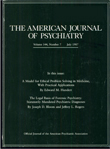The mere fact that adrenergic neurotransmission is widely distributed in the central nervous system attests to its importance not only in normal functioning but also in the pathophysiological and psychopathological states.
This book is a compilation of reviews by authors who themselves have done considerable and respectable research on the topics they write about. The chapters are divided into three main sections: Basic Science, Psychosomatic Considerations, and Psychiatric Disorders. In the first section, there is a description of the neuroanatomy of adrenergic systems, namely, the neurons of the locus ceruleus, the lateral tegmental system, the central adrenergic system, and the peripheral noradrenergic (postganglionic) neurons that make up the sympathetic anatomical system. The sympathetic system releases not only noradrenaline but also adrenaline by means of stimulation of the adrenal medulla. This is followed by a chapter on the various adrenergic receptors, which respond differently to noradrenergic and adrenergic stimulation and are affected by different agonists and antagonists. A concise review of the effects of various psychotropic drugs provides for a source of good information to psychiatric clinicians. In this section, the foundations for a better understanding of the mechanisms involved in the so-called psychosomatic conditions and other clinical entities such as affective disorders are provided by reviews of the interaction of peptides with adrenergic function in humans and animals and reviews of animal models of stress-related adrenergic dysfunction.
The second section, Psychosomatic Considerations, is introduced by a thorough and elegant presentation of the concept of stress as an evolutionary, adaptive, and potentially pathogenic condition. The contributions of Darwin, Claude Bernard, Pavlov, Cannon, and Selye are discussed in detail and with insight. The author, Davis S. Goldstein, succeeds in presenting the concept of stress as the central dynamic of adrenergic mechanisms involved in survival and pathological reactions. The rest of this section deals with the manifestation of adrenergic activity and hyperactivity that may lie at the basis of hypertensive states and with how certain personality attributes such as type A behaviors may exacerbate and how behavioral modification may ameliorate the disturbances related to central and peripheral adrenergic disturbances.
The third section consists of reviews relating adrenergic function or dysfunction to the gamut of psychiatric conditions, such as Alzheimer's disease, schizophrenia, affective disorders, anxiety disorders, eating disorders, posttraumatic stress disorders, and alcohol and drug abuse. In most of these reviews, references are cited that demonstrate abnormalities in levels of adrenergic neurotransmitters or their metabolites in CSF, plasma, or urine. Concomitantly, the authors review changes in receptor function as manifested by platelets. Most of the authors recognize and discuss the possibility that these abnormalities are not the sole cause of the condition in which they are studied and that these abnormalities are quite likely due to adjustments the organism makes to adapt to some other destabilizing factor. Some knowledge or insights are offered as to how these changes come about and how they may be related to symptoms of the disorder. Adrenergic dysfunctions in affective disorders, anxiety disorder, and drug abuse conditions lend themselves more to interpretations of the findings in terms of etiologies and mechanisms.
The data reviewed in different chapters are up-to-date as late as 1992–1993. More recent research, such as in the molecular genetics of various adrenergic receptors, is not dealt with, but those topics as yet do not necessarily lend themselves to a better understanding of adrenergic mechanism in psychobiology.
This book is generally well written in a clear and concise style, in spite of the contributions by different authors. The various chapters and sections throughout provide information in a seamless manner, as the book progresses from basic science to clinical science. References are provided at the end of each chapter. There is a very useful index at the end of the book. Pleasantly surprising is the large typescript that has been used in printing the text—economy was abandoned in favor of easy readability and preventing eye strain. All in all, this volume is a very good sourcebook for information useful to clinicians, residents, and beginning researchers.

